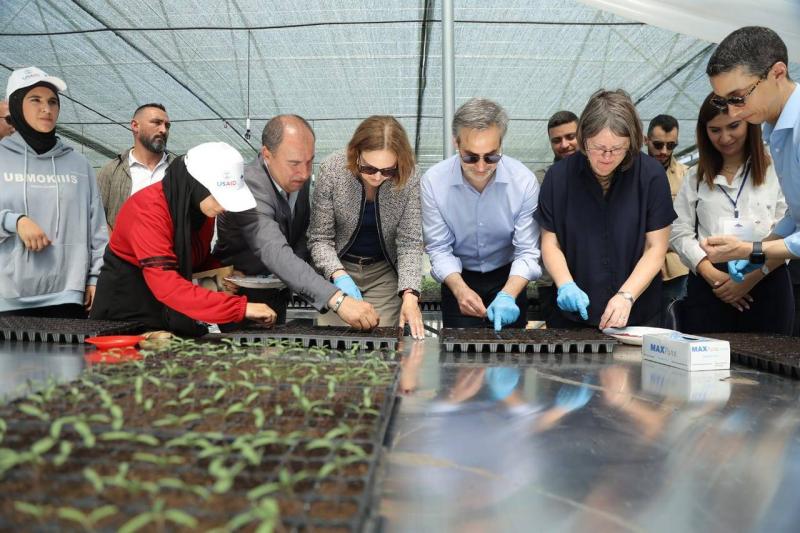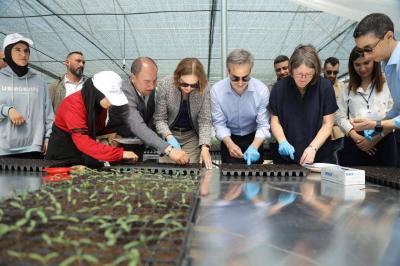U.S. Ambassador Lisa Johnson visited the Zgharta region in northern Lebanon, where she met with government officials, civil society leaders, and community members involved in two developmental projects funded by the U.S. Agency for International Development (USAID) and a program from the U.S. Embassy aimed at supporting local women’s advocacy for equal rights and access to public services.
At the Mzar'at Al-Tuffah, Ambassador Johnson attended the inauguration of a new solar-powered water pumping station. This station was established in partnership with the municipal council and in collaboration with the North Lebanon Water Authority. It utilizes clean, renewable energy to provide sustainable drinking water supplies to 5,000 residents in the area. The United States contributed $223,000 through USAID's community support program for the construction, equipment, and training for this infrastructure project, which was built on more than 2,000 square meters of land provided by the municipal council of Mzar'at Al-Tuffah. Ambassador Johnson noted, "An important part of community health and its economy lies in sustainable access to safe drinking water." She added, "Today, we see firsthand how building resilient infrastructure, such as solar farms, creates new opportunities to provide safe and affordable water to rural areas in Lebanon."
Following this, Ambassador Johnson met with project officials and members of the Zgharta community involved in the "Women’s Rights Are Human Rights" program, managed by the Lebanese NGO "Protection Support and Giving," with support from a $75,000 grant from the U.S. Embassy. This program supports local women and women-led organizations working to increase respect for women's rights, enhance access to jobs in the public sector and government services, and prevent and address violence against women and girls. The ambassador commended the Zgharta community for advocating for equality in access to education, healthcare, career advancement, and political representation. She stated, "Together, we can build a future where every individual in Lebanon, regardless of their gender, can live with dignity, equality, and freedom."
Ambassador Johnson concluded her day by visiting a vegetable nursery in the town of Arda and meeting with local beneficiaries. The nursery was established by the Rene Mouawad Foundation under USAID's Sustainable Livelihoods program, in partnership with the local NGO "Empower." This nursery improves local farmers' access to high-quality vegetable seedlings, enhancing crop productivity and food security. Supported by $59,930 in funding from USAID, "Empower" assisted in creating the nursery by leasing land, purchasing seeds, and managing seedling operations. The Rene Mouawad Foundation constructed and equipped the 1,000-square-meter nursery, providing training to 48 farmers on agricultural practices, sustainable farming, and water management. The project has supported over 100 farmers so far and created five additional full-time jobs in the town of Arda.
At each site, Ambassador Johnson reiterated the U.S. government's commitment to partnering with Lebanon to support projects throughout the country. She remarked, "As Lebanon works to get its economy back on track, the United States remains dedicated to helping it achieve long-term prosperity at both the local and national levels."
USAID's community support program includes 23 solar energy solutions in the Bekaa Valley, northern, and southern regions to alleviate the collapse of essential services. With a cumulative value of $4.8 million in U.S. development assistance, these solar solutions collectively generate nearly 2.7 megawatts of clean energy, benefiting over 435,000 citizens.
USAID’s initiative to enhance sustainable livelihoods is a $20 million endeavor to support businesses and local communities in over 100 villages in Mount Lebanon, Bekaa, and the north and south. This initiative, implemented by the Rene Mouawad Foundation, aims to improve the livelihoods of more than 10,000 families through job creation, training, technical assistance, infrastructure rehabilitation, and access to new markets.
The Public Diplomacy Section of the U.S. Embassy in Beirut is accepting applications for grants for various programs until June 21, 2024. For more information, please visit this link: https://bit.ly/3SNUt05. The Public Diplomacy Section also invites organizations or individuals to submit proposals for projects aimed at developing mutual understanding between the United States and Lebanon through arts and culture, climate action, human rights, freedom of expression, sports, and experiential learning. The deadline is June 28, 2024. Full information is available at the following link: https://bit.ly/3Qrkodr.




